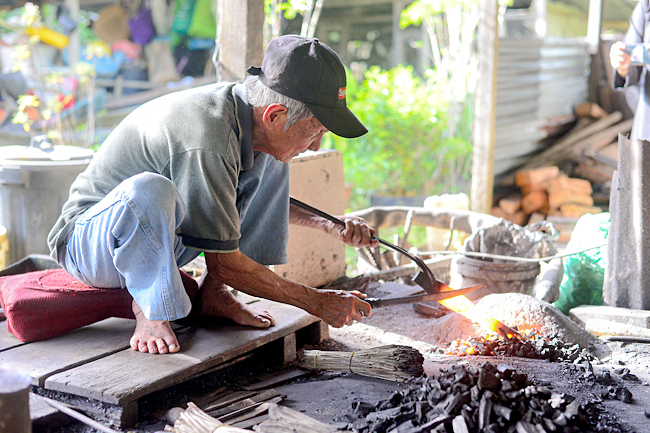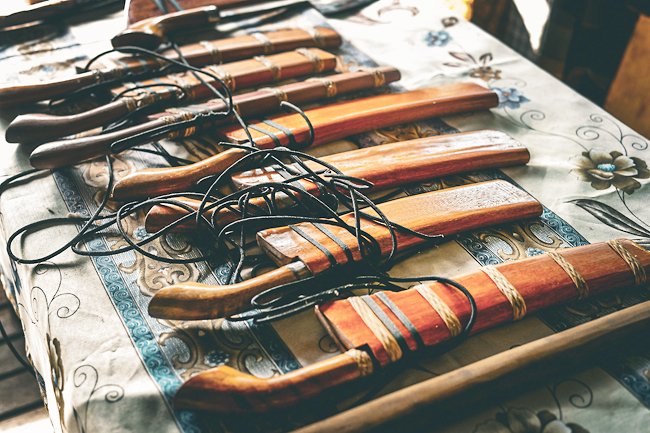Izah Azahari
The making of machetes is certainly an artform that has dwindled in size, especially in the Sultanate as many skilled blacksmiths have passed on without leaving any successors behind.
A long and storied history, the machete, known widely in Brunei as parang, is used for everything from farming and gardening, to military and self-defence purposes.
The Bulletin spoke to 90-year-old blacksmith Haji Omar bin Daud, who still actively makes all sorts of machetes, keris, play swords, axes and the like.
“I was born in 1932 and I was originally from Kampong Pandai Besi ‘B’ in Kampong Ayer,” said the 90-year-old.
“In my old village, there were 12 households – one in Kampong Pandai Besi ‘A’, while mine was at Kampong Pandai Besi ‘B’ along with the remaining 11 – with craftsmen who were skilled in making machetes.”
He reminisced his childhood, recounting the days when he first started accompanying his late father in his blacksmith workshop at the age of six where he was only allowed to work on the blacksmith bellows, producing air to keep the coal’s fire alight.


“Pumping the air is called memuput, while the air bellows are called puputan,” added Haji Omar.
In 1951, Haji Omar set off in his own direction to work in Seria for three years before returning back to Bandar Seri Begawan to change jobs. He has worked in offices such as the Public Works Department and the Municipal Department in the 1950s, and only aided his father in blacksmithing when he returned home on the weekends.
“I only began to really learn the art of blacksmithing after my father passed away and I had retired at the age of 55,” said Haji Omar, adding that he settled in his current livelihood about 10 years ago.
Explaining on how a machete is made, Haji Omar said the appropriate material must first be selected, where it is cut and shaped into the desired form through a forging method, which sees the metal heated at high temperature and pounded into shape with a hammer. This method produces a strong, durable blade that is able to retain its edge well.
However, Haji Omar said that it also depends on the type of metal used, as metal that has once been used as spring will not be good enough because it is too delicate, and if it is to be sharpened, it will not stay sharp for long.
He said that the most important part of his process is the coal and heat used to soften or melt the metal.
“When you use coal, you can’t be complacent because your metal might break and get ruined when you don’t pay attention to it. It could just be a mere two-to-three-second lag in pulling the metal out and it’ll break in two,” added the blacksmith.
With his brows furrowed, Haji Omar explained that one cannot use just any type of coal in blacksmithing. His choice of coal is made from tahi kakang wood, as other types are from pulau-pulauan wood or bamboo, which are hard and heavy.
“Even if it’s hard …if it’s not for blacksmithing, it won’t work. As time passes, it’s growing more difficult to find the right type of wood. I have to spend weeks in the jungle in search of the right ones,” he said.
He also said he often goes with his nephew, and once the wood is found, they will cut it down themselves. “If there’s a river nearby where we cut the wood, we’ll burn it into coal on the spot. If there is no water, we will have no choice but to haul it all back home.”
The number of machetes he can produce on a daily basis depends on the sizes. At times, he can produce five long machetes and a few smaller ones. He has received orders from abroad before, but since the travel restrictions put in place two years ago, he has yet to see orders from neighbouring countries. To keep the tradition alive, he had taught his 61-year-old son the craft, but with his son’s poor health conditions, he is unlikely to carry on Haji Omar’s legacy.
He underwent an eye corrective surgery a few years ago when his vision began to deteriorate.
“To look after your health, it’s important to not stop working. If you’re tired, rest and sleep. Watch your food intake too. All my life, I’ve never eaten until I’m full, and now I’m on medication only for my high blood pressure,” said Haji Omar.





